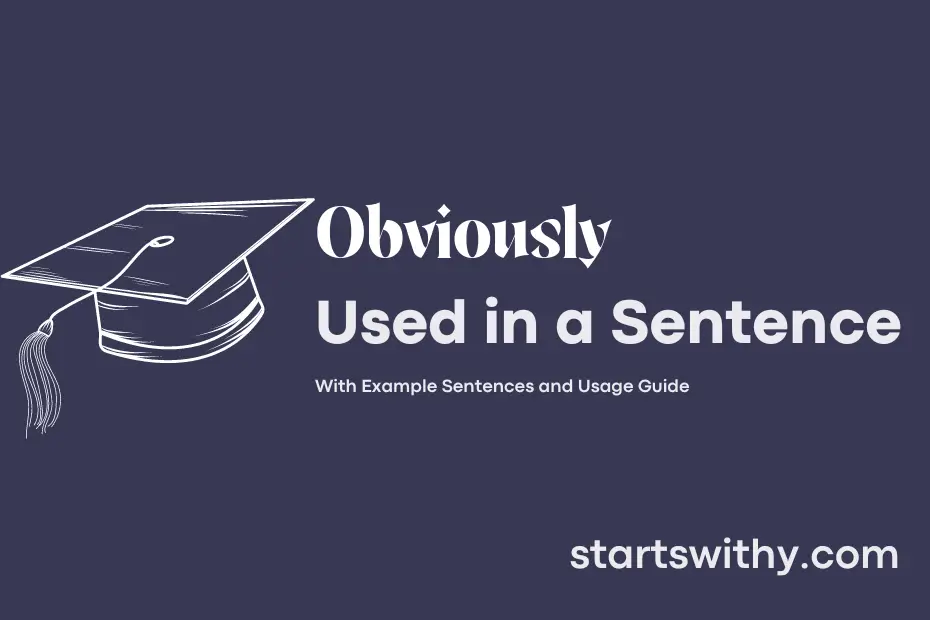“Obviously” is an adverb commonly used to express something that is easily perceived or understood without need for further explanation. This word is often employed to emphasize a point that seems clear or self-evident.
In everyday conversations and written communication, “obviously” serves as a signal to indicate a fact that is considered evident or logical. It can subtly convey a sense of certainty and underline the speaker or writer’s confidence in the information being presented.
7 Examples Of Obviously Used In a Sentence For Kids
- Obviously the sun shines during the day.
- The sky is blue, obviously.
- Birds fly in the sky, obviously.
- We breathe air, obviously.
- Flowers are colorful, obviously.
- Trees are tall, obviously.
- We need to eat food, obviously.
14 Sentences with Obviously Examples
- Obviously attending classes regularly is important for good academic performance.
- It is obviously necessary to manage time effectively to balance academics and extracurricular activities.
- Obviously seeking help from professors or tutors when struggling with a subject is a good approach.
- Obviously preparing in advance for exams is crucial to avoid last-minute stress.
- Obviously networking with seniors and professionals can open up opportunities for internships and job placements.
- Obviously participating in college fests and events can help in overall personality development.
- Obviously maintaining a healthy lifestyle with proper sleep, exercise, and nutrition is essential for staying focused.
- Obviously saving money and budgeting wisely can help in avoiding financial problems during college.
- Obviously choosing the right elective subjects that align with your interests can make learning more enjoyable.
- Obviously being involved in student clubs and organizations can enhance leadership skills.
- Obviously taking feedback from peers and mentors can help in self-improvement.
- Obviously staying updated with industry trends and developments can give an edge in competitive exams and job interviews.
- Obviously building a strong professional network can lead to potential job offers in the future.
- Obviously utilizing resources like the library, labs, and online platforms can supplement classroom learning.
How To Use Obviously in Sentences?
To use “Obviously” in a sentence, remember that it is an adverb that indicates something is clear or evident. Here is a simple guide for beginners:
-
Placement: Obviously is usually placed at the beginning or in the middle of a sentence to emphasize the point you are making.
-
Examples:
- “I studied very hard for the test, so obviously I got an A.”
- “She was the first one at the party, so obviously she was excited.”
-
Context: Obviously is often used when stating something that is easily understood or common sense. It adds emphasis to your statement.
-
Tone: When using obviously in a sentence, consider the tone you want to convey. It can come across as a bit condescending if overused, so be mindful of the context.
-
Punctuation: Remember to use commas before and after obviously when it appears in the middle of a sentence. This helps set it apart as an interrupter.
In essence, obviously is a powerful word that can help you express your ideas clearly and assertively. Just remember to use it thoughtfully and sparingly to ensure your message is communicated effectively.
Conclusion
In conclusion, the examples of sentences with the keyword “obviously” showcased how it is used to express something that is clear, apparent, or easily understood. This adverbial signal indicates the speaker’s belief that the information being shared should already be known to the listener or reader. By using “obviously” in a sentence, the speaker can emphasize the evident nature of a statement, making it stand out for emphasis. Whether used for clarifying a point or pointing out something seemingly self-evident, “obviously” serves as a useful tool in communication to draw attention to the obviousness of a given idea.
By incorporating “obviously” into a sentence, writers and speakers can guide their audience towards recognizing the logical conclusion or fact being presented. This term is particularly helpful in drawing attention to information that may be overlooked or taken for granted, thus aiding in improving the clarity and coherence of written or spoken communication. When used strategically, “obviously” can enhance the overall effectiveness of a statement by underlining its significance and ensuring that key points are readily apparent to the audience.



